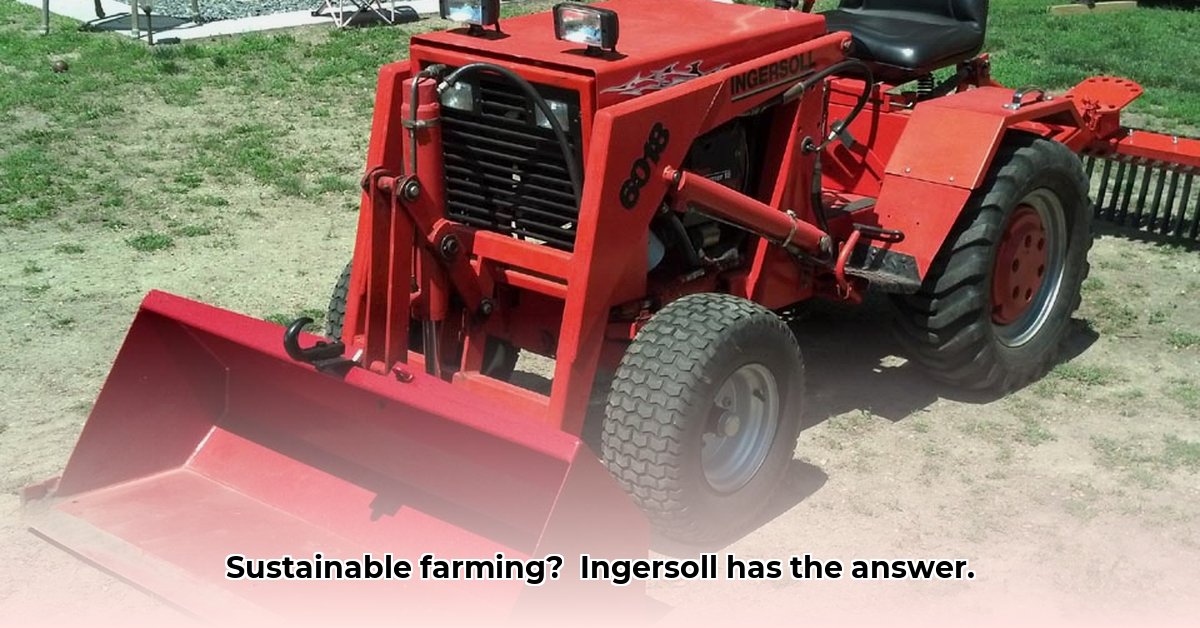
Ingersoll tractors: a name synonymous with dependability in agriculture for decades. But in an era increasingly focused on sustainable farming practices, how do these workhorses measure up? This in-depth analysis delves into Ingersoll's capabilities, limitations, and potential contribution to a greener future. For more information on Mahindra tractor parts, see this parts catalogue.
A Legacy of Innovation: Ingersoll's Journey
From their humble beginnings as compact garden tractors, Ingersoll machines have evolved alongside agricultural demands. Early models, perfect for smaller properties, laid the foundation for the robust, versatile tractors we see today. Increased horsepower, advanced hydraulic systems, and a commitment to attachment versatility have transformed Ingersoll tractors into powerful tools capable of tackling a wide array of farm tasks. This adaptability forms the bedrock of their potential within the burgeoning sustainable agriculture movement.
Ingersoll Tractors and Sustainable Farming: A Critical Assessment
Assessing Ingersoll tractors' role in sustainable agriculture requires a balanced evaluation, acknowledging both strengths and limitations. While their potential is undeniable, a critical information gap hinders a definitive assessment of their overall environmental impact.
Strengths:
- Versatile Powerhouse: Larger Ingersoll models (200, 3000, 400, and 4000 series) provide substantial horsepower and robust hydraulic systems, facilitating efficiency across diverse tasks – from plowing and planting to specialized harvesting. This versatility is invaluable for smaller farms needing a single, multi-purpose machine.
- Ideal for Smaller Farms: Their compact size and maneuverability are particularly advantageous for smaller farms or those with uneven terrains. This efficiency minimizes fuel usage compared to employing multiple, smaller machines.
- Attachment Versatility: The three-point hitch system allows for a diverse range of implements, crucial for adapting to various sustainable farming methods. This adaptability is a key element in their potential for environmentally conscious agriculture. This significantly enhances the tractor's overall usefulness and economic efficiency on the farm.
Limitations:
- Sustainability Data Deficit: A significant shortcoming is the scarcity of comprehensive data on fuel efficiency and greenhouse gas emissions. Without robust, independently verified data, a definitive statement on their environmental footprint is impossible. This lack of transparency hinders wider adoption by environmentally conscious farmers.
- Lifecycle Analysis Needed: While known for durability, a comprehensive analysis of the entire product lifecycle, including manufacturing and end-of-life disposal, is crucial to fully assess the environmental impact. Understanding the overall lifespan significantly impacts the calculation of the environmental footprint.
Actionable Strategies for Sustainable Ingersoll Tractor Use
Realizing the full potential of Ingersoll tractors in sustainable farming requires a coordinated effort from multiple stakeholders:
Farmers: Conduct a thorough needs assessment before purchasing. Compare Ingersoll models with other options, carefully weighing long-term costs and environmental considerations. Prioritize fuel-efficient practices and explore precision agriculture technologies.
Dealers: Promote Ingersoll models suitable for smaller-scale, sustainable farms. Offer trade-in programs for older, less efficient models and provide comprehensive maintenance and repair guidance for optimal fuel efficiency.
Researchers: Conduct rigorous lifecycle assessments (LCAs) of Ingersoll tractors, focusing on fuel efficiency, emissions, and material usage. Investigate modifications and alternative fuel sources to reduce environmental impact. Publish findings transparently to inform purchasing decisions.
Manufacturers: Invest in research and development to create more sustainable tractor designs. Prioritize fuel efficiency, emissions reductions, and the use of recycled and sustainable materials. Publish comprehensive data on fuel consumption and emissions for all models. Transparency builds trust with consumers and encourages responsible purchasing.
The Future of Ingersoll Tractors in Sustainable Farming
Ingersoll tractors hold considerable promise for sustainable agriculture, particularly for smaller-scale operators. However, the data deficit regarding fuel efficiency and lifecycle impact must be addressed urgently. Manufacturers have a critical role to play in fostering transparency and investing in R&D to create truly sustainable models. The future of Ingersoll's contribution to a greener agricultural landscape hinges on bridging this information gap and prioritizing environmental responsibility in design and production. The potential is immense; responsible data collection and transparency are essential for realizing it.